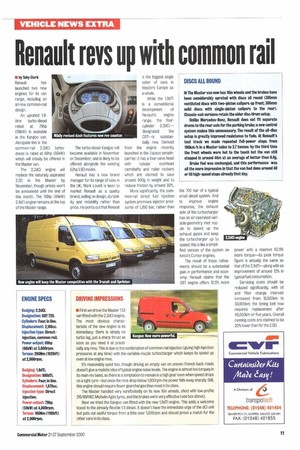Renault revs up with common rail
Page 13

If you've noticed an error in this article please click here to report it so we can fix it.
II by Toby Clark
Renault has launched two new engines for its van range, including an all-new common-rail design.
An uprated 1.9 litre turbo-diesel rated at 79hp (59kW ) is available in the Kangoo van. Alongside this is the common-rail 2.2dCi turbodiesel is rated at 88hp (66kW) which will initially be offered in the Master van.
The 2.2dCi engine will replace the naturally aspirated 2.5D in the Master by November, though prices won't be announced until the end of this month. The 113hp (84kW) 2.8dTi engine remains at the top of the Master range. The turbo-diesel Kangoo will become available in November or December, and is likely to be offered alongside the existing 63hp 1.9D model.
Renault has a new brand manager for its range of vans in the UK; Mark Lovett is keen to market Renault as a quality brand, selling on design, durability and reliability rather than price. He points out that Renault is the biggest single seller of vans in Western Europe as a whole.
While the 1.9dTi is a conventional development of Renault's engine range, the fourcylinder 2.2dCi designated the 091—is substan tially new. Derived from the engine recently launched in the Espace peoplecarrier, it has a four-valve head with tubular overhead camshafts and roller rockers which are claimed to save around 800g in weight and to reduce friction by around 30%.
More significantly, the common-rail direct fuel injection system promises idector pressures of 1,350 bar, rather than the 700 bar of a typical small diesel system. And to improve engine response, the exhaust side of the turbocharger has an air-operated variable-geometry inlet nozzle to speed up the exhaust gases and keep the turbocharger up to speed: this is like a simplified version of the system on lveco's Cursor engines.
The result of these refinements should be a substantial gain in performance and economy: Renault claims that the 09T engine offers 12.5% more power with a massive 62.5% more torque—its peak torque figure is actually the same as that of the 2.8dTi—along with an improvement of around 12% in typical fuel consumption.
Servicing costs should be reduced significantly, with oil and filter change intervals increased from 10,000km to 30,000km; the timing bell now requires replacement after 115,000km or five years. Overall running costs are claimed to be 20% lower than for the 2.5D.












































































































